- Home
- Mark Wayne McGinnis
Cloudwalkers Page 10
Cloudwalkers Read online
Page 10
Conn found the old man—hunched and skeletal-looking, with wispy white hair and a long white beard—leaning over his workbench. His spectacles were precariously perched near the tip of his nose. A partially disassembled rackstaff lay open before him, like a corpse being autopsied. The rack smith held the end of a long delicate tool, perhaps some kind of screwdriver, between both his thumb and forefinger; turning it with infinitely careful precision.
“You dare show yourself here?” he asked, not taking his eyes off his work.
Conn was well aware that the rackstaff that Gould was now attending to was none other than his own.
“I have no excuse.”
“There was blood . . . dried and caked within the delicate workings.”
Conn took a step closer and leaned in. He didn’t understand the exact workings of a rackstaff, but from his perspective he couldn’t see any sign of blood among the staff’s shiny metal gears, ratchet spindles, actuating arms, locking turrets, or rotating bearings.
“You say you parried a pipe?”
“It was aimed at my head.”
“Aye . . . well, a proper rackstaff would have survived that with no problem.”
Conn wasn’t sure he’d heard him right. His rackstaff was a good one, it had belonged to his grandfather. Easily one hundred-and-fifty years old.
Gould looked up. “This staff, it’s a piece of shit.”
Conn thought about that. A Cloudwalker’s rackstaff had a close connection with the person who owned it and wielded it. Coming from anyone else, Gould’s statement was the kind of insult that demanded physical confrontation. He momentarily imagined taking the old, frail racksmith to task, giving him a backhand to the face. Or maybe kicking him down the Chrysler building’s inner stairwell. Of course, he’d never truly consider it. If Gould said something was wrong with his rackstaff, well, he was probably right.
“Is it even worth fixing, sir?”
“Aye, but not for you. Instead, this will be given to the school, for a young Cloudwalker in training.”
Conn felt a stab of grief for the loss of his rackstaff, which had been with him for years, but he said nothing.
Gould let out a long breath and stared back at Conn. “Dark days are coming, young man. When you have lived nearly a century, as I have, you grow to ken such things. I can feel it in these creaky old bones.”
Conn simply nodded, unsure if the old man really knew something.
“I have been waiting for the right person.”
“The right person?”
Gould turned—staring up at the top row of rackstaffs hanging near the high ceiling—then used a crooked finger to help locate what he was looking for. “There it is.”
Conn’s eyes had already locked onto it before Gould pointed it out. The rackstaff was fully extended, the Ragoon wood darker than any he had ever seen before. Its paw looked to be somewhat larger than was typical, too.
“Reach up there and get it down for me.”
“Aye, sir.” Conn looked around for something to stand on. The staff’s sharp tip was higher than he could reach.
“Don’t be a wallaper, use my stool . . . go on, get up there, get it for me.”
Conn did as told. Balanced on tiptoes atop the old man’s stool, he reached up for the dark rackstaff. As his hand grasped the cool Ragoon wood, a powerful, painful jolt coursed up his wrist, then his arm and into his chest. He heard himself scream before everything went black.
Chapter 16
So many fierce Skylander wars had taken place throughout their history. Many thousands died, defending the honor of their clan. In the stability of the last two decades, such bloody business was easy to forget, but Gordon Folais had more reason than most to remember it now.
Stability and peace seemed to go hand in hand, Gordon figured, as he padded along the hallway of an upper floor in the 234-floor tower where the Folais clan—close to nine hundred men, women, and children—resided.
Through the soles of his bare feet, he could detect a chill through the hard Indiana limestone flooring. Rising up quickly under his ankle-length nightgown, the cold sent a shiver through his entire five-foot-two inch frame.
Gordon openly wept again, using his sleeve to wipe away a river of gooey snot from beneath his runny nose. The news of his Janis’ death had hit him like a lightning bolt. Janis had been so bright, a force to be reckoned with, and now he was dead, splattered and cold on the damned ground.
Others, especially those narrow-minded Jersey City elders, had argued against his proposal. Well, if Janis’ death could do some good, it was this: the day to act has arrived. He’d known for more than three years now, as he watched the cloudbank become more and more unstable over Jersey City. By the day, more and more of the cloudbank turned to quickfall, which would neither be walked nor stood upon.
Gordon transferred his grasp on the burning lantern from his right hand to his left as he reached his destination and unlatched the centuries-old wooden door. Pushing it open, its hinges complained audibly. No one was allowed in this section of the building, not even himself. The simple act of breaching this corridor was punishable, not so far as demanding a Fall From Grace, but it was a significant crime nevertheless. Gordon made a mental note to review such old decrees and have them updated. But he’d think about that tomorrow.
The air here was stifling. So much accumulated dust, and so many dark, lingering memories. An entire high-rise floor where those with extraordinary powers, often a hundred or more such individuals, once conducted their unique, often dark pursuits. Nearly twenty years ago, all of them had either been executed or banished. It was said the entire floor was still haunted by their dark spirits. Stopping mid-step, Gordon spun about. Had he heard the faintest of footfalls from behind? No, of course not, he thought, pushing away such ridiculous notions. He stole a glance toward nearby shadows that seemed to be moving and swaying in ominous and exaggerated ways. Mind trickery, he thought.
Gordon’s lantern flared when he entered the suite of rooms once inhabited by the late High Priestess Lark Kincaid. He glanced at the heavy velvet draperies, covering the windows, and at the ornate tapestries adorning the walls, depicting various distant times in history, both collecting dust now. The Kincaid legacy was one filled with centuries of strange magic and sorcery. Rubbish, he thought. Nothing of the occult world took place back then. There was nothing that couldn’t be explained by science.
Just as some humans were genetically more adept at perceiving the variety of shades and colors of the cloudbank, a few fortunate others could also subtly draw upon the unique elemental properties of Strongzine, Stradamine, and Starlox. It all came down to basic physics: How those strange and amazing otherworldly elements reacted. No, not just reacted, but counteracted, he thought, to the presence of an electrical discharge. That was why there was no technology about, why there never could be. But the human brain was a mass of electrical discharges—synapses firing millions upon millions of times daily.
Fortunately, the discharge was not nearly robust enough to call forth resulting lighting bolts from the cloudbank. Yet it was certainly adequate enough for select individuals to forge a sort of intimate relationship with it, an inter-playing of energetics where forces of gravity could be ever so subtly manipulated. Not magic, just science. But even knowing all of that didn’t keep Gordon’s lantern-wielding hand from starting to tremble uncontrollably. Last night, he had secretly commissioned the most abhorrent of all Skylander crimes. It would surely mean a death sentence for him, if discovered.
In retrospect, Gordon wondered if he had made a terrible mistake. After all, he thought, it was put there for a reason. Perhaps so, though he still deemed it was necessary at the time, the only way to ward-off the use of magic within the Skylander realms. The Sùilean Uamhasach—the terrible eye—had ensured for twenty years that any high priest or priestess would be powerless, unable to perform any kind of wizardry within the Skylander realms of Jersey City and Manhattan. It ensured peace—a balance of
power between all the clans—and its placement set in motion the ousting of the Macbeth clan and their centuries of overbearing dominance. Heavily guarded by the Dorcha Poileas, the beautiful, sapphire-glass meteorite dated back to the Ruin Event, and had been displayed upon a high pedestal within the Chrysler Building. Gordon’s heavy influence over the Dorcha Poileas, plus the well-timed break that left the meteorite momentarily unguarded, were all that was needed for the hulking Grounder men to abscond away with the large stone. By now, they had carried it below cloud level, where it would be well hidden, its energetic influences now properly shielded.
Gordon, swiping at his dripping snotty nose with his hand, wiped the wet mucus residue onto his nightclothes. Standing upright, he again pondered the previous evening’s burglary. Word had not yet spread of the theft. All too likely, the Manhattan clans were conspiring to keep it quiet. If they had it their way, they would never spread the news to the Jersey City clans, because as Gordon knew all too well, they looked upon him and his city as inferior. He stared down at the floor, as if he could see the well-hidden meteorite secured over a thousand feet below.
Gordon briefly wondered how long it would take before the aftereffects from the meteorites removal would take. It needed to happen soon. Jersey City’s quickfall patches were spreading, and worsening conditions would soon make this entire realm uninhabitable. Attending to the twenty-year absence of High Priests or Priestesses was now more essential than ever. The very thought of the power that they would afford him made Gordon smile.
The self-appointed CloudKing moved farther into the complex of abandoned rooms, again struck by the level of luxury in which Lark Kincaid had lived. Each one of those supposed mystics had been both adored and feared in Skylander society, and allowed to live like royalty. But that same power they’d once yielded over CloudMasters and CloudKings alike eventually led to their demise. All too often, their powers became a liability, the worst of all prevailing evils.
Gordon soon found the one room in particular he’d set out to locate on this somber, sleepless night. He used the flame of his lantern to light up another, mounted high up on the wall. With the room now better illuminated, he noticed the library walls were paneled with dark Ragoon planks, and that the three outfacing floor-to-ceiling windows had been replaced with beautifully intricate stained glass pictorials. Gordon raised his lantern to better make out the glass images. Some kind of battle seemed to be in progress. He confirmed as much seeing a beautiful warrior woman—her wild hair the color of a blazing setting sun—wielding a raised, fully-extended rackstaff. A lightning bolt was shooting out from its spear-like tip. In the distance, a ragged and smoldering hole was depicted with incredible detail in the glass cloudbank, with throngs of enemy combatants—kilted men and women—falling through to their imminent demise. The pictographs were a sobering reminder of just how dangerous a path that Gordon now walked. Was resurrecting such potential calamity upon them worth it? But do I have a choice? Who else has the power to move the cloudbank—to save my city?
As Gordon moved to the center of the room he pondered whether Lark’s very spirit still resided within the suite’s four walls. Perhaps she was standing right next to him, waiting for him to do exactly what he’d come for. He swallowed hard and tried not to think about it, reminding himself he was a man of science and not mysticism.
Built-in shelves took up one entire wall, holding a countless number of books undoubtedly outlawed for their mystic themes eons ago. But it was a tall sideboard table against the back wall that captured his full attention. Made of Ragoon wood, with glass on its sides and top, it stood four feet tall and three feet deep, large enough to hold the stack of big leather-bound tomes that sat atop it. Decision made, Gordon quickly moved across to the sideboard then turned the top tome toward him so he could read the gold-embossed lettering.
Kincaid Lineage and Genealogy
Putting that one aside, he read the letters on the next one.
Conjuring Disciplines
Gordon raised a brow. That certainly sounded interesting, but it wasn’t what he was looking for. He smiled when he read the embossed lettering on the third book.
Skylander Maps and Routes
He hesitated before opening the leather-bound cover. No—I’ve already come this far. Turning it over, he took in the first colorful and intricate graphical map depiction of the Skylander world. Hand-drawn, pen and ink illustrations instantly provided a rare perspective of the Skylander realms beyond the borders of northeast America. Drawn from information gathered by pigeon messengers and travelers on foot, these maps were an extremely limited commodity, and many Grounders and Skylanders alike lived in complete ignorance to their existence. At first glance, Gordon noted there were easily fifty Skywalker realms around the world. Many were impossible to reach because of the dangerous, deadly oceans that stood between them, yet there were others much closer, such as the high-rise metropolises in Toronto and Detroit. On turning the page, this time both his brows arched upward. It was a geographical representation of North America’s mountain ranges, which facilitated a number of other Skylander realms. Closest were the Adirondacks. Something illegible was written atop White Mountain, he noticed, and then later crossed out. Not a good sign, being crossed out. He dragged a forefinger across the page, coming to a stop at the highest peak in western North Carolina, an area circled in red grease pencil. Perhaps Lark. Inscribed were the words High Priest Dwaine Kincaid. Gordon tapped his finger several times atop the name. He’d heard that name before, a relative of Lark’s. Wasn’t he one of the first ousted? Yes . . . maybe her brother, or perhaps an uncle. Definitely a dark soul, that one. Gordon remembered that much of past history.
Gordon was aware his heart rate had doubled, perhaps tripled. Had the Kincaid high priests and priestesses found solace among those mountain folk after their ejection from society? Did this distant location, so boldly circled in red, provide for a society much like theirs? If so, he would bring one or more of those so-called magicians back to Jersey City.
He turned back to the three stained glass windows, and the beautiful rackstaff-wielding warrior, who now seemed to be looking directly at him. Soon, Skylanders of both Jersey City and Manhattan would become one people, united under Gordon as CloudKing. But first, the issue of local cloudbank density needed to be addressed; there was so much quickfall. Moving the cloudbank back into position—perhaps even strengthening it further—would be their first order of business. Gordon wasn’t quite sure how it worked, but hell, they could take some of it from Manhattan if that’s what needed to be done. He didn’t care, just as long they saved his city. Briefly, he wondered how much enticement Dwaine Kincaid and his ilk would need to get them here. As CloudKing of Jersey City and Manhattan combined, there was much he could offer.
Gordon Folais shrugged as he closed the book, placing it securely under one arm. First thing tomorrow, he’d assemble a team of skilled Cloudwalkers to start the long journey south across the cloudbank to the high peaks of North Carolina. Once there, they could later send back a carrier pigeon with news of their discovery. They would intuitively know not to return here should their mission be unsuccessful. His Cloudwalkers would throw themselves into a patch of quickfall before disappointing their CloudKing.
Quickfall. Gordon’s thoughts returned to Janis, and tears began welling in his eyes again, impairing his vision, which was probably for the best. For as he departed the library of the late High Priestess Lark Kincaid, the wall-mounted lamp flame suddenly fluttered out. The remaining tomes, lying in disarray atop the sideboard table, slid back to their centermost position then restacked themselves—one on top of the other—in a far more orderly fashion than he’d left them.
Chapter 17
Misty sat quietly upon the floor, her legs drawn up, both arms wrapped around her knees. The Romano’s grotto was surprisingly quiet, even for such an early hour. Typically, Aurora’s father and two brothers would be bustling about, yelling this or that—making jokes and throwing
insults—but not today. They’d already left, attending to what remained of her broken family’s harvest. They would return home late in the day to start work tilling their own larger field of crops.
Misty tried not to think about the awful happenings of the previous day, but the mental image of her father being mercilessly flogged kept rising up and lingering, like steam above a boiling pot. Her negative feelings for Deacon Terrence Lasher went far beyond mere words. Hatred and loathing didn’t come anywhere close to expressing what she was feeling. And then there was her mother’s misfortune. Unlike her poor father, whose wounds would heal with time, Astrid would endure a different kind of torture, one that would last the rest of her life. Where is she now? Has that repulsive, evil man already had his way with her? Misty wondered.
She watched as Mrs. Romano attended to her father, now lying atop a mat on his stomach, his arms outstretched over his head. After she finished cleaning and disinfecting each of the wounds on his back, she said, “Let’s get you sitting up, dear.” She gently helped him, careful not to tear any of the previous day’s sutures. She then proceeded to wrap his torso with several layers of clean bandages.
Apparently, Aurora was now awake too. Misty heard the clanging of pots and pans coming from the kitchen area. In her own home, the kitchen has in the same room as everything else besides the bedrooms, and Misty was still adjusting to all the extra space in the Romano family’s house.
“That should do it for the time being,” Mrs. Romano said, rising to her feet. She used her palms to wipe smooth the crease in the thick black fabric at the front of her dress. “Best I go see what Aurora is up to in the kitchen. Try as she might, everything she does leaves the skillet blackened to cinders. The poor girl is a terrible cook.”

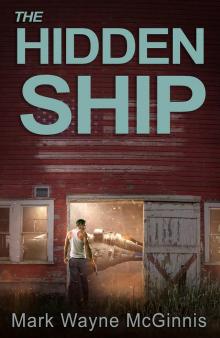 The Hidden Ship
The Hidden Ship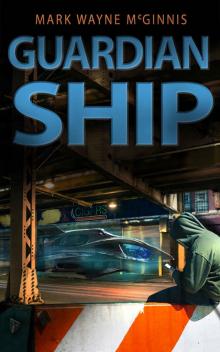 Guardian Ship
Guardian Ship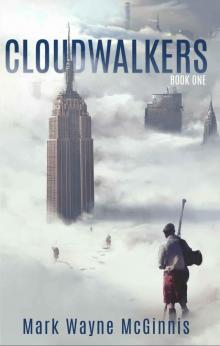 Cloudwalkers
Cloudwalkers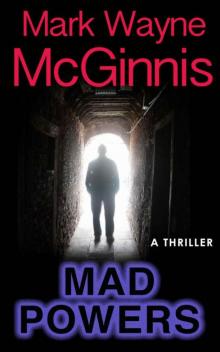 Mad Powers (Tapped In)
Mad Powers (Tapped In)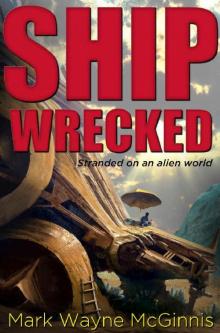 Ship Wrecked
Ship Wrecked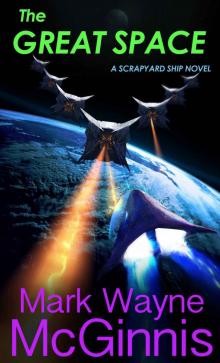 The Great Space (Scrapyard Ship Book 6)
The Great Space (Scrapyard Ship Book 6)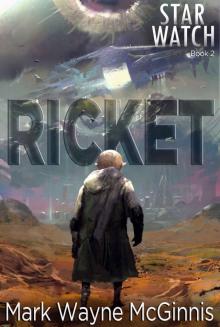 Ricket (Star Watch Book 2)
Ricket (Star Watch Book 2)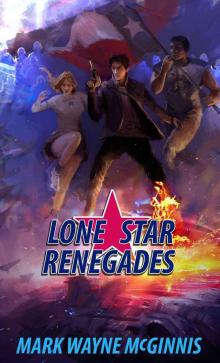 Lone Star Renegades
Lone Star Renegades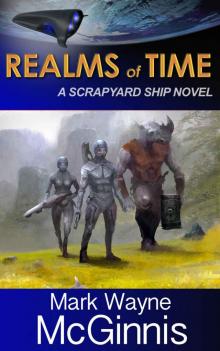 Realms of Time (Scrapyard Ship)
Realms of Time (Scrapyard Ship) Glory for Sea and Space (Star Watch Book 4)
Glory for Sea and Space (Star Watch Book 4)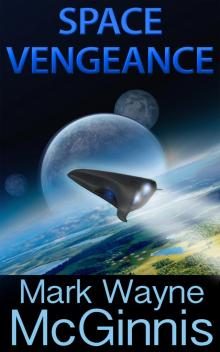 Scrapyard Ship 3 Space Vengeance
Scrapyard Ship 3 Space Vengeance Boy Gone
Boy Gone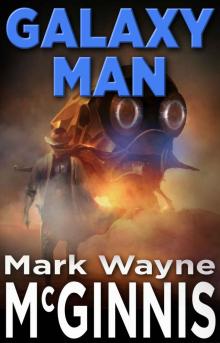 Galaxy Man
Galaxy Man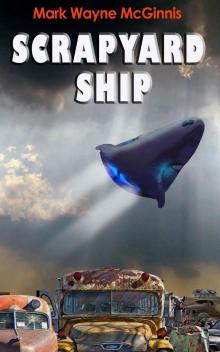 Scrapyard Ship
Scrapyard Ship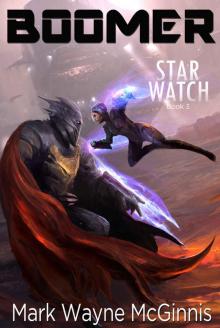 Boomer (Star Watch Book 3)
Boomer (Star Watch Book 3)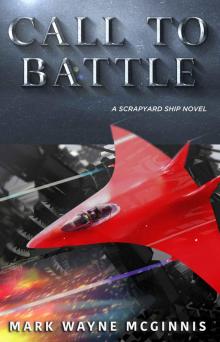 Scrapyard Ship 7: Call to Battle
Scrapyard Ship 7: Call to Battle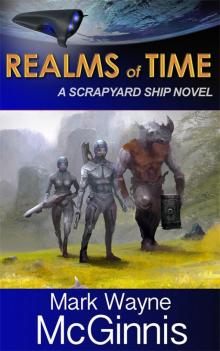 Scrapyard Ship 4 Realms of Time
Scrapyard Ship 4 Realms of Time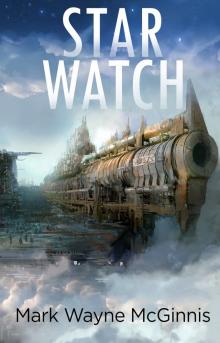 Star Watch
Star Watch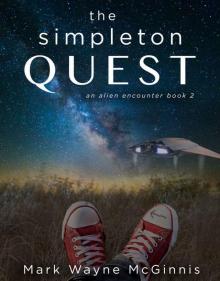 The Simpleton QUEST
The Simpleton QUEST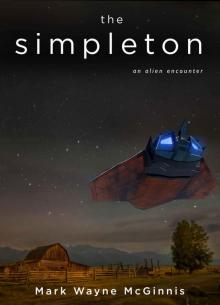 The Simpleton: An Alien Encounter
The Simpleton: An Alien Encounter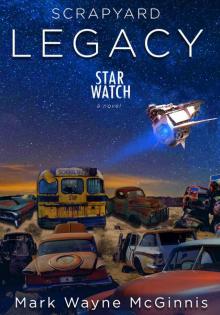 Scrapyard LEGACY (Star Watch Book 6)
Scrapyard LEGACY (Star Watch Book 6)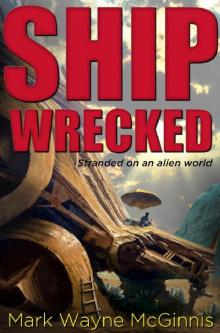 Ship Wrecked: Stranded on an alien world
Ship Wrecked: Stranded on an alien world